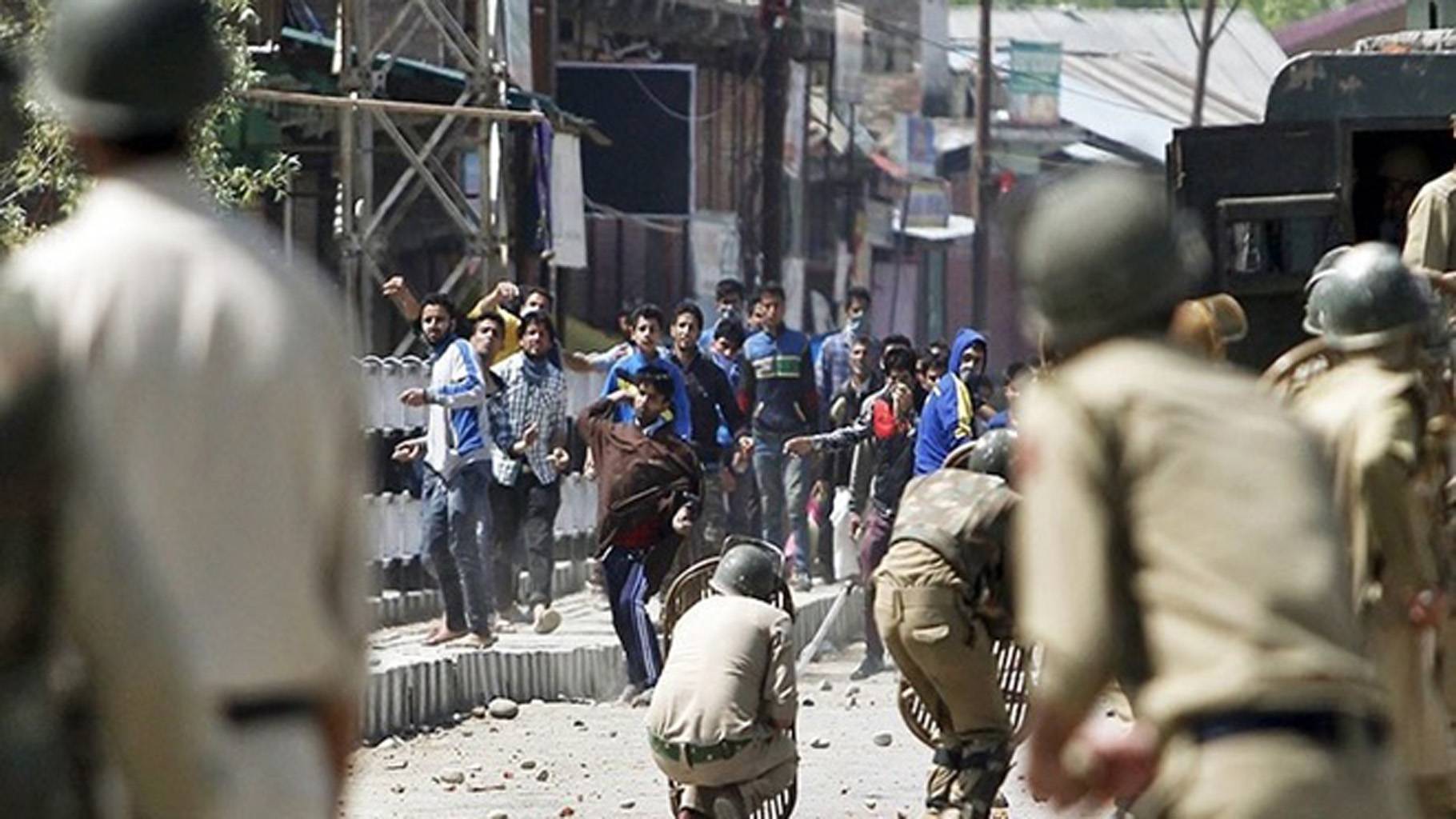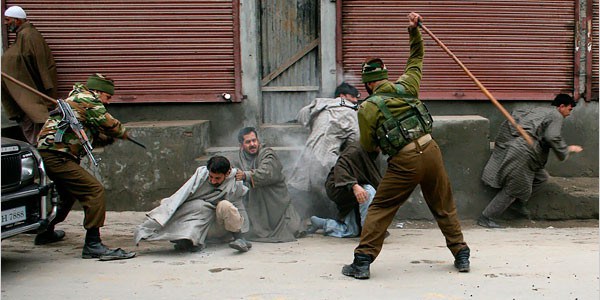The Kashmir issue has become the world’s oldest unresolved dispute in the modern international system in which respect for human rights matters less for the occupational forces of India. The Indian expansionist behaviour in the South Asian region has become a major cause behind the disputed land of Kashmir, which is a bone of contention between New Delhi and Islamabad. The leaders of both states, contesting on the disputed land of Kashmir, have adopted inflexible positions on Kashmir while standing against each other in the regional and global politics. In response to the ideological affiliation of the Kashmiri Muslim population with Pakistani Muslims, the India government, obsessed with an anti-Pakistani policy has waged an era of unending human rights violations in its occupied areas in order to suppress the voice of independence in Kashmir. The demand for freedom from Indian brutal occupation have resulted an presence of Indian security forces in the occupied areas where the majority of Muslim population are united against Modi’s brutal policies. The draconian face of prime minister Modi has adopted a harsh position over the captured areas of South Asian disputed land meting out inhumane treatment of Kashmiris. Contrary to the hawkish behaviour of New Delhi, Islamabad has advocated a peaceful solution of the issue. The government of Pakistan has proposed various peaceful steps under Islamabad’s vision of a peaceful and stable South Asian region. In order to gain support of the international community, New Delhi launched an international campaign based on incorrect information to mislead the global leaders. Leaders of Pakistan are determined to present an actual and factual picture of Kashmir where the general public is suffering under New Delhi’s illegitimate rule. The presence of Indian security forces in the occupied areas has resulted in massive human rights abuses where security forces carry out numerous ways of victimising the people fighting for their independence.
The primary reason behind the increasing human rights violations in Kashmir is the arrival of Modi in Indian politics and the shadows of Hindu anti-Muslim ideology on New Delhi. An increased role of Bharatiya Janata Party (BJP) in India along with the rise of Modi as prime minister has multiplied the sufferings of Muslims living inside and outside India. Muslim communities, whether living in Kashmir or India, are becoming victims of BJP’s Hindu-nationalist stance which has not only stigmatised the Indian position in the world, but it has bought into question the Indian democratic system structured on so-called secular ideological foundations. Prime minister Modi has tarnished new Delhi’s vision of a secular India because his administration decided to implement a strict policy of curbing the social and political rights of local Kashmiris in the occupied areas. In response to an overwhelming wave of massive human rights abuses under Modi government, the political authorities from Islamabad decided to adopt a peaceful approach to rescue the people living under Indian occupation with the help of the international community. The pursuit of resolving a dispute between the two nuclear powers has led Islamabad to adopt a peaceful approach, and the government of Pakistan preferred to take various measures at national and international levels parallel to carrying an international campaign based on unilateral initiatives. A peaceful approach for addressing the Kashmir issue has propelled Pakistani leaders to launch a global campaign for highlighting the plight of Kashmiris living under Indian occupation.

Islamabad’s leading state officials are trying to convince the international community about India’s violent policies for managing disputed Kashmir. The expansionist behaviour of Modi for the promotion of Hindu extremist ideology led New Delhi to approve a plan for increasing presence of security forces in the occupied areas of Kashmir. This is result of Modi’s political approach for winning elections and for securing an influencing role in New Delhi. The pursuit of political objectives led BJP leaders to play a Hate Card against Islamic ideology by launching a nationwide anti-Muslim campaign equivalent to intensifying the Kashmir issue by victimising the Kashmiri Muslim population particularly. BJP’s winning of election by receiving majority votes and the election of Narendra Modi as the fourteenth prime minister of India was a success of Hindutva ideology which gave confidence to Modi government to take a harsh position on Kashmir issue. It also encouraged extremist Hindu nationalist leaders to launch a full-fledged campaign against the Muslim population, which has resulted in a high rate of human rights abuses in South Asia. The populous Muslim areas of Kashmir and India have become victims of New Delhi’s Hindutva policies. As a result, an abnormal rise of major human right rights violations from the Southern Asian region has become a permanent feature where Pakistan is willing to address the question of Kashmir through peaceful means. Contrary to Islamabad, New Delhi under extremist Hindu leaders are determined to curb the voices of freedom in Kashmir.
A long history of Pakistan’s peaceful efforts for settling disagreements with India can viewed through analysing the historical archives of South Asian politics. The plan for carrying a peaceful policy against an aggressive neighbour led the initial leaders of Pakistan to adopt broadly defensive regional policy structured in various reactionary moves in the post-1947 environment. The reactionary measures against Indian belligerent regional policy compelled Pakistani leaders many times to take hard decisions. An appropriate Defence of the state’s autonomy and sovereignty moved Pakistani leaders to emphasise on peaceful moves for managing of foreign relations with the neighbouring nations. They decided to introduce various ways forwards to the South Asian problems analogous to obtaining the counterbalancing potential against Indian aggressive hegemonic desires. In this way, leading political authorities of Pakistan decided to convince India on various peaceful moves through proposing different solutions to the regional problems because Islamabad believed that permanent settlement of regional problems peacefully could help create a stable South Asia regional political order. But Indian leader did not only refuse the Pakistani proposal for resolving bilateral issues with India, but decided to oppose Islamabad’s position on various regional problems.
Consequently, the India aggressive position against territorially adjoining nations emerged as a permanent feature of New Delhi’s foreign relations. Instead of paying appropriate attention towards the main issue which is a bone of contention with its nuclear neighbour, New Delhi entered in a new violent domain on Kashmir with the entrance of Modi as Indian prime minister. Contrary to his Pakistani counterpart, prime minister Modi inaugurated a new phase of bloodshed in the occupied areas of Kashmir. In this way, the continuation of the regional belligerent attitude of New Delhi became a horrible feature of South Asian region under the Modi administration, the Hindutva ideology of BJP is determined to keep the regional politics in India’s favour.
The mainstream framework of Islamabad’s approach for dealing the Kashmir issue has been developed on the reactionary basis, and the leaders of Pakistan have started preferring to resolve this dispute through non-violent means. An adaptation of a reactionary policy against Indian aggressiveness led Islamabad towards different unilateral measures which can highlight the Kashmir problem internationally. Pakistani authorities have planned several unilateral initiatives to express its peaceful stance on Kashmir issue as it believes that the promotion of its peaceful campaign for the resolution of the problem will allow world leaders understand realise the pain of Kashmiri people living under Modi’s brutal policies. Pakistani campaign emphasises the use of media in order to communicate Indian exploitation of Kashmir people and Modi’s policies of terminating the fundamental values of human rights in Kashmiri globally. Pakistani media is persistently releasing various videos of Kashmiri people suffering under Indian occupation in the forms of songs, movies and dramas because the media is recognised internationally as an effective tool of conveying messages. The involvement of media as an essential means for projecting an actual picture of Kashmiri people has become one of the important elements of Islamabad’s Kashmir policy. Majority of Pakistani people prefer to call the Kashmiri people their unarmed brothers fighting for their freedom and becoming victims of Indian belligerent policies. The sentimental involvement of Pakistani people with their Kashmiri brothers has become an essential feature of Pakistani society which can easily be observed across the country.

At the international level Pakistani leaders have communicated to the world that the government of Pakistan can go to any length to protect the Kashmiri people from violent Indian policies. Due to the rising level of human rights abuses in Kashmir, it has become a difficult task for the international community to turn its back on the Kashmir issue. The rise of human right abuses in Kashmir under the Modi administration has become a harsh reality in contemporary international system. Modi’s Kashmir policy have increased the presence of Indian security forces in the occupied areas, which has brought about a miserable picture of humanity. Apart from refusing Pakistani claims of human rights violations in Kashmir, the Modi government does not accept the role of the international community. In this way, the secular image of India has not only been stigmatised globally, but it has started facing an international wave of criticism. Still, the Modi government is planning to keep India active in world politics because New Delhi believes that the international community cannot ignore the significance of India in the contemporary geopolitics of the world. The Modi administration believes India is a big market globally and nations with strong economies from around the globe are willing to invest in India. The economic potential of India has become one of the strongest points of attraction for the international community, which will ultimately help New Delhi in raising its economic growth.
Moreover, New Delhi has cleared its vision of counterbalancing China in the international environment which could help keep anti-Chinese states in favour of India. Modi’s antipathy towards China has made New Delhi a heart of global geopolitics, and the strategic calculations of the great powers have recognised India as an important strategic point of international politics. In this way, the combination of economic and strategic features of the international system has improved the status of India in world politics which has convinced many states to cultivate cooperative ties with India. Without impartially evaluating the role of New Delhi in the nuclearised subcontinent, the leaders of the great powers are reluctant in discussing the Kashmir issue with India.
In order to communicate the level of human rights abuses in Kashmir, Islamabad has adopted a peaceful approach of highlighting the Kashmir issue globally which will be an appropriate measure for communicating the actual sufferings of Kashmiri people globally. The Indian active role in the international community under the Modi government has introduced an economic framework for engaging world’s developed countries. This is an attempt for keeping the Kashmir issue away from world’s leaders. As a result, an overwhelming wave of major human rights violations has encircled the Kashmiri areas living under Indian occupation. In response to Modi’s belligerent role in the region, the government of Pakistan adopted a peaceful approach because the history of Pakistan is full of peaceful measures proposed by Pakistan to the neighbouring aggressive Hindu state. The post-1947 decades of subcontinent’s history witnessed a number of peaceful measures taken by Pakistan to ensure peace and stability in the broader South Asia region. Pakistani efforts for creating a peaceful South Asian political order has always been tarnished by India because the efforts of Islamabad have always been considered by New Delhi a threat to their mission of securing regional hegemonic status. In this way, regional problems created by India mainly revolve around New Delhi’s dream of expanding its influence in its home region through violent means.
In response to the situation mentioned above, the greater responsibility lies with the international community where the great powers are diplomatically supporting India while pursuing their own strategic and economic interests instead of taking care of the hapless Kashmiri people. Leaders from around the world need to realise the significance of Kashmir issue because the Kashmiri voices are waiting for the international community. In addition to Pakistan’s unconditional support to Kashmir, the people from around the world need to feel the pain of Kashmiri society suffering under Indian occupation.




